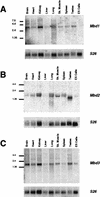Identification and characterization of a family of mammalian methyl-CpG binding proteins
- PMID: 9774669
- PMCID: PMC109239
- DOI: 10.1128/MCB.18.11.6538
Identification and characterization of a family of mammalian methyl-CpG binding proteins
Abstract
Methylation at the DNA sequence 5'-CpG is required for mouse development. MeCP2 and MBD1 (formerly PCM1) are two known proteins that bind specifically to methylated DNA via a related amino acid motif and that can repress transcription. We describe here three novel human and mouse proteins (MBD2, MBD3, and MBD4) that contain the methyl-CpG binding domain. MBD2 and MBD4 bind specifically to methylated DNA in vitro. Expression of MBD2 and MBD4 tagged with green fluorescent protein in mouse cells shows that both proteins colocalize with foci of heavily methylated satellite DNA. Localization is disrupted in cells that have greatly reduced levels of CpG methylation. MBD3 does not bind methylated DNA in vivo or in vitro. MBD1, MBD2, MBD3, and MBD4 are expressed in somatic tissues, but MBD1 and MBD2 expression is reduced or absent in embryonic stem cells which are known to be deficient in MeCP1 activity. The data demonstrate that MBD2 and MBD4 bind specifically to methyl-CpG in vitro and in vivo and are therefore likely to be mediators of the biological consequences of the methylation signal.
Figures






Similar articles
-
MBD3L1 and MBD3L2, two new proteins homologous to the methyl-CpG-binding proteins MBD2 and MBD3: characterization of MBD3L1 as a testis-specific transcriptional repressor.Genomics. 2002 Dec;80(6):621-9. doi: 10.1006/geno.2002.7001. Genomics. 2002. PMID: 12504854
-
MBD3L2 interacts with MBD3 and components of the NuRD complex and can oppose MBD2-MeCP1-mediated methylation silencing.J Biol Chem. 2005 Apr 1;280(13):12700-9. doi: 10.1074/jbc.M413492200. Epub 2005 Jan 27. J Biol Chem. 2005. PMID: 15701600
-
Genomic structure and chromosomal mapping of the murine and human Mbd1, Mbd2, Mbd3, and Mbd4 genes.Mamm Genome. 1999 Sep;10(9):906-12. doi: 10.1007/s003359901112. Mamm Genome. 1999. PMID: 10441743
-
Methyl-CpG-binding proteins. Targeting specific gene repression.Eur J Biochem. 2001 Jan;268(1):1-6. doi: 10.1046/j.1432-1327.2001.01869.x. Eur J Biochem. 2001. PMID: 11121095 Review.
-
Regulation of transcription and chromatin by methyl-CpG binding protein MBD1.Brain Dev. 2001 Dec;23 Suppl 1:S174-6. doi: 10.1016/s0387-7604(01)00348-5. Brain Dev. 2001. PMID: 11738867 Review.
Cited by
-
Recognition of methylated DNA through methyl-CpG binding domain proteins.Nucleic Acids Res. 2012 Mar;40(6):2747-58. doi: 10.1093/nar/gkr1057. Epub 2011 Nov 22. Nucleic Acids Res. 2012. PMID: 22110028 Free PMC article.
-
Functional genomics in Spiralia.Brief Funct Genomics. 2023 Nov 17;22(6):487-497. doi: 10.1093/bfgp/elad036. Brief Funct Genomics. 2023. PMID: 37981859 Free PMC article.
-
SHREC Silences Heterochromatin via Distinct Remodeling and Deacetylation Modules.Mol Cell. 2016 Apr 21;62(2):207-221. doi: 10.1016/j.molcel.2016.03.016. Mol Cell. 2016. PMID: 27105116 Free PMC article.
-
The Alpha-Synuclein Gene (SNCA) is a Genomic Target of Methyl-CpG Binding Protein 2 (MeCP2)-Implications for Parkinson's Disease and Rett Syndrome.Mol Neurobiol. 2024 Oct;61(10):7830-7844. doi: 10.1007/s12035-024-03974-3. Epub 2024 Mar 2. Mol Neurobiol. 2024. PMID: 38429622 Free PMC article.
-
The Methyl-CpG-Binding Domain 2 and 3 Proteins and Formation of the Nucleosome Remodeling and Deacetylase Complex.J Mol Biol. 2020 Mar 13;432(6):1624-1639. doi: 10.1016/j.jmb.2019.10.007. Epub 2019 Oct 15. J Mol Biol. 2020. PMID: 31626804 Free PMC article. Review.
References
-
- Antequera F, Boyes J, Bird A. High levels of de novo methylation and altered chromatin structure at CpG islands in cell lines. Cell. 1990;62:503–514. - PubMed
-
- Bartolomei M S, Tilghman S M. Genomic imprinting in mammals. Annu Rev Genet. 1997;31:493–525. - PubMed
-
- Bassett D E J, Boguski M S, Spencer F, Reeves R, Goebl M, Hieter P. Comparative genomics, genome cross-referencing and XREFdb. Trends Genet. 1995;11:372–373. - PubMed
-
- Beard C, Li E, Jaenisch R. Loss of methylation activates Xist in somatic but not embryonic cells. Genes Dev. 1995;9:2325–2334. - PubMed
Publication types
MeSH terms
Substances
Associated data
- Actions
- Actions
- Actions
- Actions
- Actions
- Actions
- Actions
- Actions
- Actions
- Actions
- Actions
- Actions
- Actions
Grants and funding
LinkOut - more resources
Full Text Sources
Other Literature Sources
Molecular Biology Databases
Research Materials
Miscellaneous
